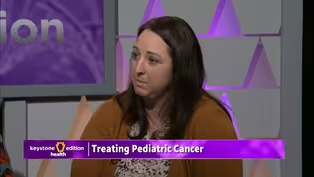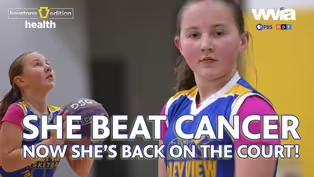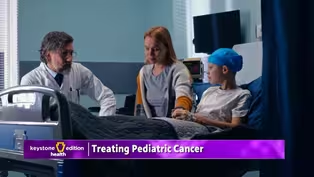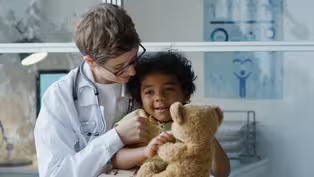Keystone Edition
Supporting Families Through Pediatric Cancer: Early Diagnosis, Treatment, and Financial Aid
Clip: 2/17/2025 | 8m 40sVideo has Closed Captions
Experts discuss pediatric cancer, early diagnosis, and financial aid for families.
Join Dr. Nathan Hagstrom, Diane Dutko, and Jessica Schlichter as they discuss the challenges of pediatric cancer, early diagnosis, and the financial and emotional toll on families. Learn how ThinkBIG Pediatric Cancer Fund supports families, the evolving treatment options, and the vital role of community support in fighting childhood cancer.
Problems playing video? | Closed Captioning Feedback
Problems playing video? | Closed Captioning Feedback
Keystone Edition is a local public television program presented by WVIA
Keystone Edition
Supporting Families Through Pediatric Cancer: Early Diagnosis, Treatment, and Financial Aid
Clip: 2/17/2025 | 8m 40sVideo has Closed Captions
Join Dr. Nathan Hagstrom, Diane Dutko, and Jessica Schlichter as they discuss the challenges of pediatric cancer, early diagnosis, and the financial and emotional toll on families. Learn how ThinkBIG Pediatric Cancer Fund supports families, the evolving treatment options, and the vital role of community support in fighting childhood cancer.
Problems playing video? | Closed Captioning Feedback
How to Watch Keystone Edition
Keystone Edition is available to stream on pbs.org and the free PBS App, available on iPhone, Apple TV, Android TV, Android smartphones, Amazon Fire TV, Amazon Fire Tablet, Roku, Samsung Smart TV, and Vizio.
Providing Support for PBS.org
Learn Moreabout PBS online sponsorship- Joining us tonight, we have Dr. Nathan Hagstrom, Chair, Department of Pediatrics at Lehigh Valley Health Network.
Diane Dutko, Executive Director for Think Big Pediatric Cancer Fund.
And Jessica Schlicter, an outpatient social worker with Janet Weis Children's Hospital.
Thank you all for joining us tonight.
- [Panel] Thank you.
- Obviously, we're about to have a conversation for what is probably the most horrific diagnosis a parent could hear, but I'd like to believe that we'll have some positive messaging for folks as well as helping people understand what they can do if they receive this news.
Diane, I'd like to start with you.
Can you tell us a little bit about Think Big and how this organization came about?
- Yeah, well, ThinkBIG was started by inspiration that came from a young man named Carmine Monacelli who had bone cancer.
Dr. Colby Wesner was a resident at that time and he worked with Carmine and he was always just astounded by Carmine's demeanor.
One day, he wanted to be a pope.
One day, he wanted to be a scientist.
Carmine always thought big.
Unfortunately, Carmine passed away and Colby vowed to his mother and to pediatric cancer itself that he was gonna do something to make a difference for these families.
And that's how ThinkBIG was started.
- Nate, you've been doing this for a while, but how long has pediatric oncology been a specialty and how do you think it becoming its own specialty improved diagnoses for children?
- It's been a specialty really for over 70 years.
Children were among the first to be treated for and cured for cancer.
- Jessica, obviously, once people meet with someone like Nate here, you're probably the next person that they're speaking to.
What's the first conversation that you're having with families after they've heard this news?
- Normally, first, I'm assuring them that they are in great hands.
Our doctors are well versed in the medicine and research and all the latest scientific facts.
And then I'm talking to them about community resources, support, insurances, making sure, taking a little bit of those burdens off that there is help out there.
- Yeah, I'd imagine that first conversation is kind of hard because obviously they've been given this news, their mind is probably reeling, So you're gonna take it a little bit slow.
I know, Diane, you have your own personal story, which is part of why ThinkBIG is a passion project for you.
Can you tell us a little bit about that?
- Sure.
Back in 2017, at Christmas time, my three-year-old granddaughter was diagnosed with neuroblastoma, and she treated at Geisinger Danville and she treated at chop.
But after a journey of about 11 months, she ran a head Davin, and watching my family navigate pediatric cancer, ThinkBIG was there for my family to help them during that journey, that uncertainty, that fear, all of the things that are wrapped up into a pediatric cancer diagnosis.
And it was shortly thereafter that I became a board member of ThinkBIG in a way to give back.
And I was on the board for four years before they invited me to be their executive director.
So how could I say no?
They helped my family and, you know, we need to give back to families that are experiencing the same thing we went through.
So that's why I'm where I am today.
So it was just because of care and a journey that, you know, I wouldn't have asked for for sure, but your response is what gets you through.
- Well, thank you for stepping up to the plate after having had your own experience.
I'm sure there are many families who appreciate that.
Nate, in terms of diagnosis, obviously I would assume the earlier you diagnose, maybe the better prognosis you have.
Is that true with pediatric cancer?
- Most pediatric cancers are rapidly growing and cause a wide range of symptoms.
So the sooner the child gets treatment, the sooner they'll feel better.
- And is childhood cancer similar to adult cancer or do they act differently?
- Most adult cancers are slow growing.
Pediatric cancers come on quickly and can cause problems quickly, so you definitely want to treat it early.
But the good news is it responds well because most anti-neoplastic medications are actually attacking the cell's ability to divide and grow.
- Jessica, let's say this family's now been with you for about two weeks.
What sorts of things are parents starting to think about?
I mean, there's the obvious, right?
The kids probably aren't going to school, et cetera, but I think there's those things that we wouldn't even think about.
- Yeah, so most times when I meet with families, their biggest question is, how do I pay for this?
We're gonna do whatever we need to do to get our child the care they need, but what is this gonna do to our family in the long run?
And that is probably one thing that I've learned the most reassurance with the family is that in Pennsylvania, all of the children diagnosed with an oncological diagnosis qualify for medical assistance.
And if they have a primary insurance, that gets billed first, followed by the medical assistance.
However, that doesn't stop their everyday bills.
They still are working less, taking periods of time off.
So part of my role is hooking them up with organizations like Diane from ThinkBIG and they have just been a tremendous support to almost all of our patients.
- Nate, how long can treatment take?
I know it's different for different types of cancer, but if we're talking about a family who may need some extra help, what timeframe are we looking at?
- For most of the common types of childhood cancer, it's six months to two, two and a half years.
- Oh wow, okay.
And where do you come in, Diane?
- Well, I come in when Jess notifies me of a family and we have an allocations team that reviews all the applications and then we are looking for usual common household expenses.
Our mission is to just alleviate the stress that pediatric cancer brings and help them, you know, feel the hug that they really need and that they don't have to think about, how am I gonna pay my mortgage this month?
We'll do that for them.
- [Tonyehn] And about how many families are you supporting per year?
- [Diane] Per year?
60, 65 families.
- [Tonyehn] And how many of them are coming from you?
How many families come through your... - I think on an average month, I usually submit between 15 to 20 applications a month.
- Wow.
And what counties are you covering?
Is this the whole state of Pennsylvania?
- We're not quite there yet, although it is definitely a goal.
We are in 31 PA counties in Northeastern and Central Pennsylvania and probably as far west as kind of near Altoona.
We do have a University of Pittsburgh child that is now treating with us because we expanded by five counties in August, so they were included in that.
And that's what we do is, you know, a little bit at a time, add a few counties to make sure that, you know, we stand ready to serve them, that there's no compromise on, you know, what they will benefit from us.
So it's been very gratifying to see that, also very sobering to see it, and as I'm sure that you really see that all the time.
- [Tonyehn] And how has treatment changed?
I believe when we talked earlier, you talked a little bit about biologics.
How is that different from what people think about as traditional treatment?
- Yeah, the whole idea behind biologicals is to get more specific about what you're targeting, what's abnormal about that cancer cell and avoid damaging normal cells.
And it's allowed us to not only cause less, you know, toxicity from the treatment, but actually get better outcomes.
- So the children are responding well with less side effects?
- Yes.
- Okay.
Causes, Support Programs & Family Resilience
Video has Closed Captions
Clip: 2/17/2025 | 12m 45s | Experts discuss pediatric cancer causes, remission rates & family support. (12m 45s)
She Beat Cancer & Returned to the Game She Loves
Clip: 2/17/2025 | 3m 11s | At just six years old, Addie was diagnosed with cancer—but she never let it stop her. (3m 11s)
Treating Pediatric Cancer - Overview
Clip: 2/17/2025 | 1m | Treating Pediatric Cancer - Overview (1m)
Treating Pediatric Cancer - Preview
Preview: 2/17/2025 | 30s | Watch Monday, February 17th at 7pm on WVIA TV (30s)
Providing Support for PBS.org
Learn Moreabout PBS online sponsorship
- News and Public Affairs

Top journalists deliver compelling original analysis of the hour's headlines.

- News and Public Affairs

FRONTLINE is investigative journalism that questions, explains and changes our world.












Support for PBS provided by:
Keystone Edition is a local public television program presented by WVIA



